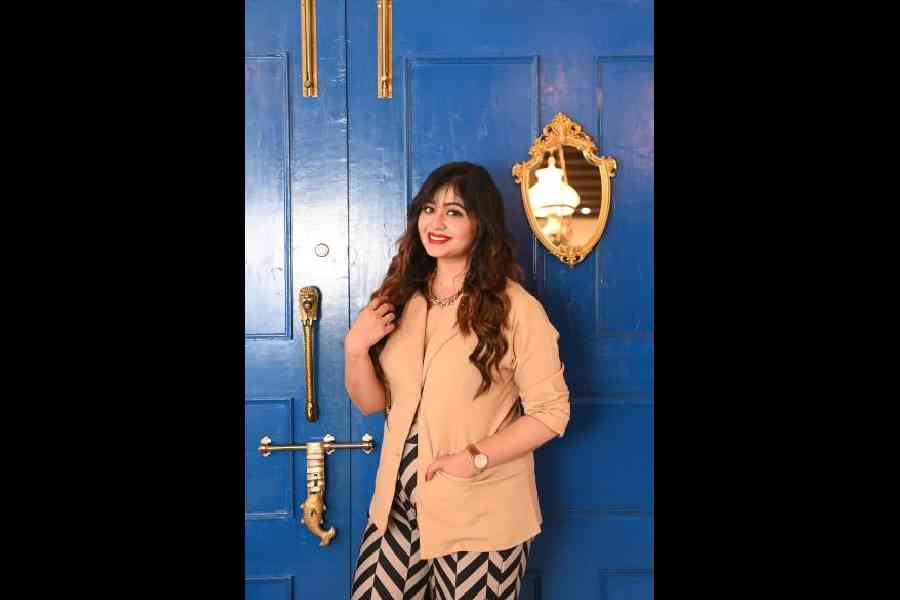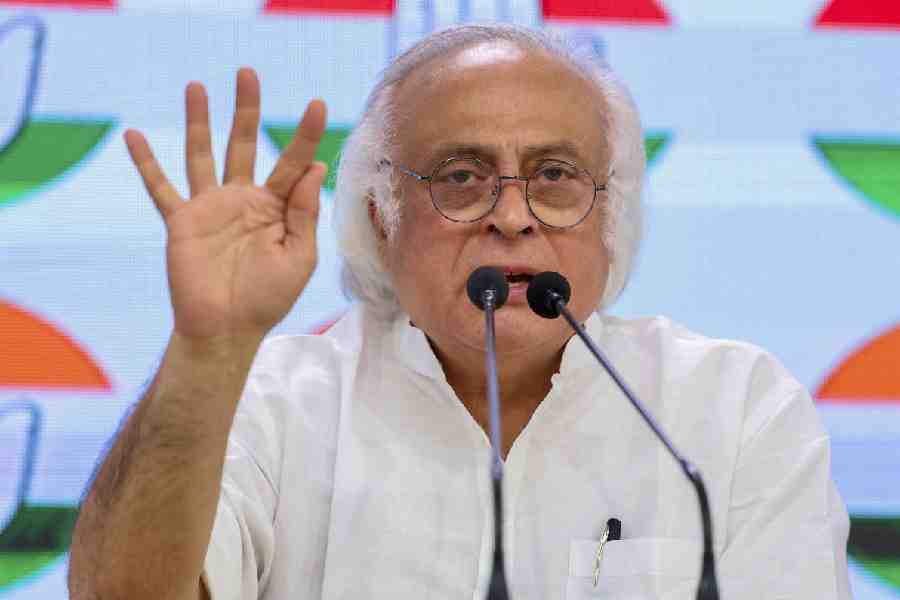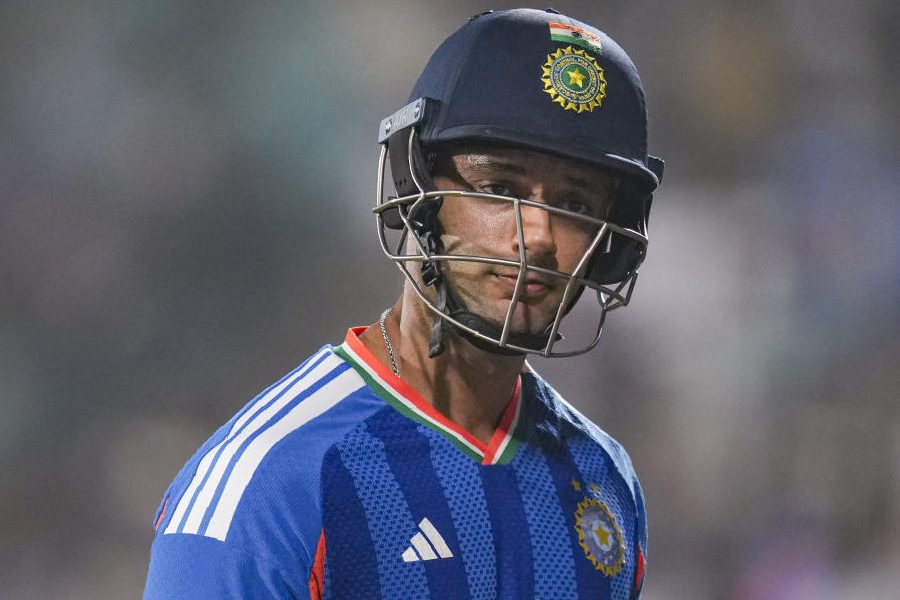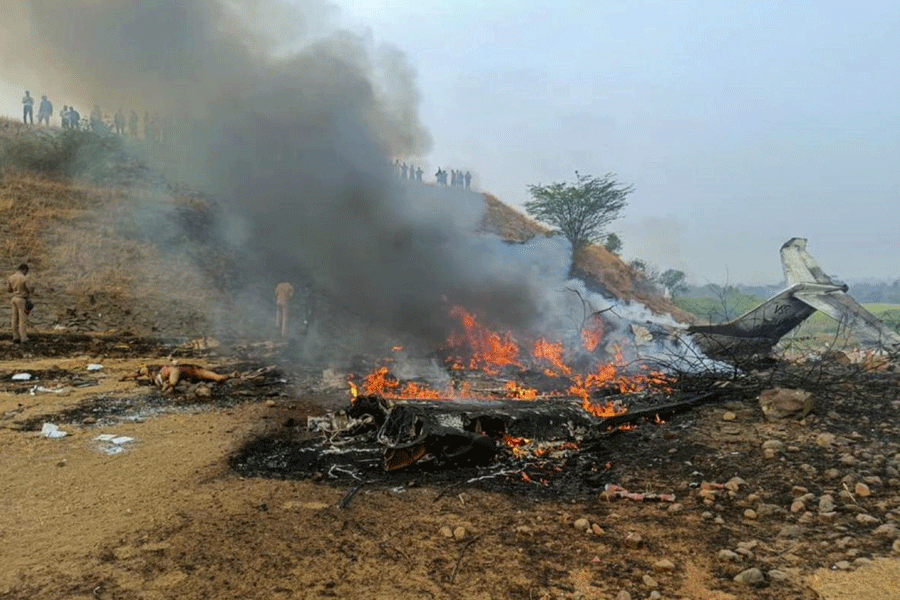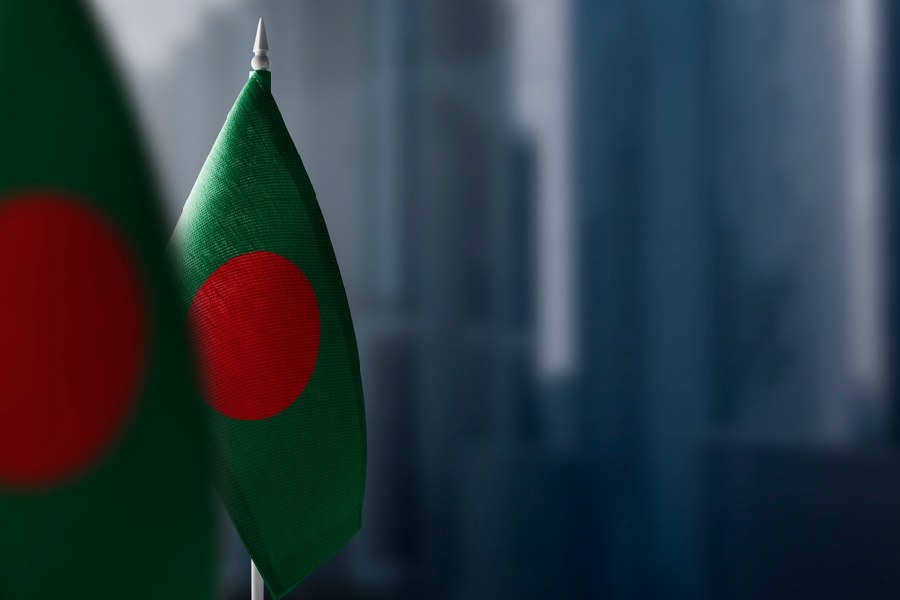There is a warrior-like quality in Ritabhari Chakraborty. She never gives up. Through all the health woes she has been through in the last few years, the multi-hyphenate actress has aced it with a smile on her face and with her loved ones by her side. Her passion to keep working has kept her going, and she has emerged from the challenging times with box-office winners like Fatafati and Bohurupi. A week before the shooting of her Friday film Batsorik commenced, Ritabhari broke her leg. That didn’t stop her from playing Brishti as authentically as she could, though. The Mainak Bhaumik film releases on June 6. The actress has more reasons to smile too. She just got engaged to screenwriter Sumit Arora. Excerpts from our freewheeling chat with Ritabhari at her Salt Lake home on life, love and work.
We know you love horror films, but is shooting a horror film spooky?
I am more scared of doing something wrong on the sets, because horror is a very technical genre. I am way more scared of people than something that I have not seen. I mean, tell me, if you’re like walking down a dark alley, you’d rather have a shakchunni jump on your shoulder than a man jumping on you, any day! Having said that, whenever I’ve seen a very creepy horror film like Ram Gopal Varma’s Bhoot or The Haunting of The Hill House (series)... I would just look at my own reflection in the mirror and scream. That happens!
Coming back to the film, when I did Pari, I remember there was this shot in the climax where Anushka Sharma is like pulling me up and throwing me on a table, and the table is crashing and falling. I had no such experience before, and I had no clue how they were going to execute it, but when I did it, I just realised how the whole thing is so technical. For Bangla cinema, it’s all the more difficult because we do not have the sort of money to keep on shooting something for way too long or for too many days or be dependent on VFX or fancy prosthetics. So we came up with something which is more of a drama horror, than just horror, horror. It’s a Bangali ghost story.
In the film, my husband dies, and Satabdidi (Roy) plays my sister-in-law. I’m going through this depression, this darkness inside me, and she kind of worries, and she comes to live with me, to check on me. And like how they say, ‘Ondhokar jome bhoot ashe’, keeping that in context, the darkness inside me sort of attracts the evil spirit that was already in the house somewhere, which might or might not have killed my husband. Didi knows something is wrong, but I keep saying I don’t believe in ghosts. She’s going through so much pain herself that she has no time to believe in this evil spirit, or even God, for that matter. She is not in a position where she can even process what spirituality is, because how she planned her life with the love of her life is ruined in a minute. She’s living in complete denial, after almost a year.
At the core, it’s the story of these two women. One is trying to make the other one move on, and the other one doesn’t want to. And that is a very relatable emotion for anyone who watches the film, anyone who ever had difficulty letting go or sort of rather live in denial than accept the trauma of losing someone.
There are jump-scare moments in the film. And we do, at some point, see the spirit, and that was creepy. That has been my favourite shot of the film. Haru, who has done prosthetics for the film, has done a really good job. The producers have totally let Mainak have whatever he needs to make something look believable and engaging, and not funny.
Where did you shoot it?
We shot it completely in Calcutta. The house itself was a big character. We must have shot for like 15-16 days, but the set took 10 days to be built because the house had to have a certain character. My husband used to be an artist who started painting creepy things towards the end of his life, so his studio had to have a different character. But the best part is, Mainak took 25 days to finish the sound. That’s the thing about horror, the sound is almost like the lead cast. It has to be right, otherwise you do not get the creeps... in both silences and music.
You have now done two back-to-back films with Mainak...
Mainak is absolutely one of my favourite people ever since I have known him. And I think when we met in Grihostho, our biggest achievement out of that film was finding each other, that we can be such great collaborators, because we have very similar minds. Of course, he is so much more senior to me. We watch similar kinds of films. I usually need someone to talk about all the odd content that people usually don’t watch, which Mainak does. So he has always been a horror and thriller buff. And when we did Grihostho, I told him that this was literally just the tip of the iceberg. There’s so much more we can do.
When I heard my co-actor is Satabdi Roy, I asked him, how did you even think of it?! It’s such a rare idea or rare thought. He does a certain kind of film. I have done a certain kind of work in the past, which has a sure audience, and I’m continuing to do that. But with this one, we felt that let’s try something different. Audience is accepting different kinds of content. It’s storytelling at the end of the day, right?
Mainak’s films have always celebrated women. How you see women and how Mainak sees women, where do they meet in Batsorik?
Women characters written by men are usually very linear. They want children, want to sacrifice their life for the man, want to always look pretty, and always want to do the right thing. That’s how men generalise women. Truth to be told, women are not that all the time, and every woman is not that for sure. They are flawed. Why do we have to live up to some expectation of being a certain kind of God? We have all been trying so hard from such an early age to do it all and do it right, to look good, to perform well, to know where the stock market went, yet not have our eyebrows being too bushy, have our legs waxed, show up at job on time, please your family, be the right daughter and the right partner. Where does it stop?
I feel Mainak understands that not every woman is the same... seeing women as people is something Mainak has done for a while, and I appreciate that. I’ve been very fortunate that Brahma Janen Gopon Kommoti and Fatafati are written by a woman. There was a lot of space in there to be someone who’s not always colloquially accepted. Same goes for Bohurupi, how didi (director Nandita Roy) wrote Pori. It’s not surprising a lot of men didn’t get it.
The humanity of women is always taken away by calling us Goddesses. Stop it. We want to be people. We don’t want to be a Goddess.
How has your filmography changed in the last five years?
I always wanted to do interesting roles. It took me a while to realise what kind of roles would also make my audience feel excited to see me on screen. And that’s been some map I have done, with hits and misses, and eventually I realised that the more authentic I am, the more acceptance I have got in terms of playing any part, for that matter, and I have stopped choosing characters and I choose films now. Not everything that comes feels like it’s something for me to do.
Let’s end on a fairy-tale note, far from horror. Tell us a little bit about your man, Sumit Arora...
We don’t have a date yet (for the wedding), but we know that we want to get married next year, in February. We’re looking at getting married somewhere beautiful, where we do not have to worry about lots of cameras or anyone capturing us without our consent. Sumit and I have been marriage-phobic for a very long time, and it finally came to the point where now it’s like now or never kind of a point.
He’s so intelligent, well-informed, but very shy. You can talk to him about so many things. We started dating six-seven years ago and then broke up. At that point in time, I remember, he used to be very different... he has evolved with time. I had the flu recently, and he flew down from Thailand where he had gone for a break, to take care of me. He is probably one of the few men I have known in my life who’s capable of change. Eventually, he became the opposite of what he used to be. He became this person who would show up whenever I needed him to.
Styled by: Kiara Sen
Hair and make-up: Tapsee

